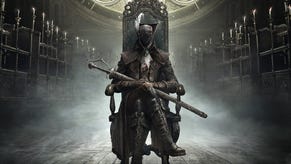Turning down Elden Ring's difficulty would "break the game itself", says Miyazaki
"That wasn't the right approach".
FromSoftware's Soulsborne games are notoriously difficult to beat, but creator Hidetaka Miyazaki has said it would "break the game itself" to turn down the challenge.
In an interview with The Guardian, Miyazaki discussed how high difficulty is not only creatively part of the game, but also has led to its success.
"If we really wanted the whole world to play the game, we could just crank the difficulty down more and more. But that wasn't the right approach," he said.
"Had we taken that approach, I don't think the game would have done what it did, because the sense of achievement that players gain from overcoming these hurdles is such a fundamental part of the experience. Turning down difficulty would strip the game of that joy - which, in my eyes, would break the game itself."
Of course, difficulty is subjective, and Elden Ring's new expansion Shadow of the Erdtree does not add any further accessibility options to the game.
However, in an interview with Eurogamer, Miyazaki said: "this is not something I'm opposed to in the slightest," adding "we're going to continue to look into it and see how we can do those features in our future titles."
Shadow of the Erdtree is released today and, as Miyazaki previously told Eurogamer, its difficulty is relative to the end of the base game.
"We wanted to provide these challenging encounters and these menacing threats, and in order to do that, we wanted to give the player a lot of freedom of approach," he said. "We wanted them to feel free in how they choose and when they choose to approach and tackle these hardships.
"So players who look for that sort of challenge in our games will find a challenge on equal footing in the DLC as well."
Difficulty was a key point in our Elden Ring: Shadow of the Erdtree review.
"It's true that this distinct type of FromSoft-engineered frustration is an indispensable part of the Souls experience - to hurl yourself repeatedly against a seemingly immovable object until through sheer luck and serendipitous timing, you somehow prevail," it reads.
"There is real palpable joy and pride and relief in that - we've all felt it, and with the blessing of hindsight, suddenly all of that failure feels like it was worth it. In other cases they're genuinely instructional, with real lessons learned. This, however, feels like difficulty for difficulty's sake, turned up to eleven, perhaps because with the added expectations of a DLC having something extra-absurd to conquer even though it technically doesn't require finishing the core game."





_MEGHzTK.png?width=291&height=164&fit=crop&quality=80&format=jpg&auto=webp)
.png?width=291&height=164&fit=crop&quality=80&format=jpg&auto=webp)

-Teaser-Trailer-(Directors-Cut)-_-Short-Film-2025-0-24-screenshot.png?width=291&height=164&fit=crop&quality=80&format=jpg&auto=webp)

